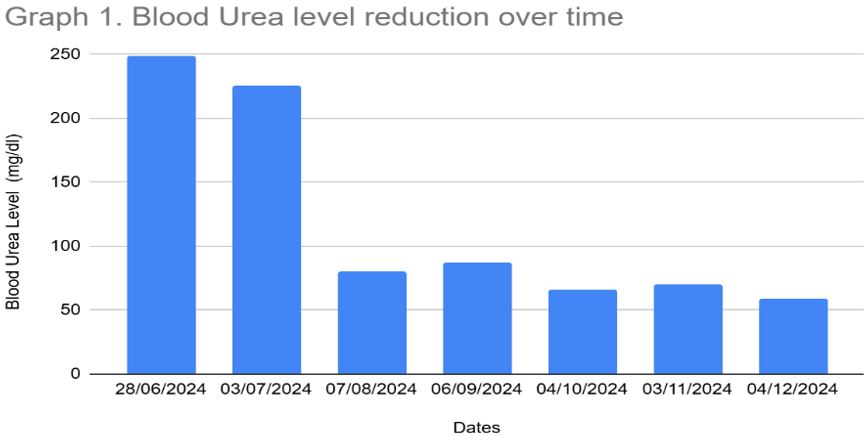Integrative Ayurvedic management of Chronic Kidney Disease highlighting the efficacy of Panchakarma and Ayurvedic Formulations: A Case Report
DOI:
https://doi.org/10.21760/jaims.10.5.36Keywords:
Chronic Kidney Disease, Type 2 Diabetes, Hypertension, Panchakarma, Urea, Creatinine, Ayurveda Management, Vrikka VikaraAbstract
Chronic Kidney Disease (CKD) is a progressive condition marked by a gradual decline in renal functions, often accompanied by complex and poorly understood etiopathogenesis. Conventional medical treatments for CKD, including peritoneal dialysis, haemodialysis and renal transplantation, aims to manage symptoms but presents limitations. Ayurveda provides a comprehensive alternative, emphasizing dietary and lifestyle interventions alongside the therapeutic potential of ayurvedic formulations and bio-balancing therapies. This study reflects the case of a 57-year-old male with CKD, Type 2 Diabetes and hypertension, who had symptoms such as dyspnoea, facial puffiness, constipation and generalized weakness. Following Ayurvedic treatment, which included Ayurvedic medications and Panchakarma therapies, the patient reported significant symptomatic relief. Laboratory investigations revealed a notable reduction in serum urea and creatinine levels, further affirming the effectiveness of the intervention. This case underscores the potential of Ayurvedic management as a holistic, safe, and efficacious approach for CKD, offering promising avenues for integrated healthcare.
Downloads
References
Longo DL, Fauci AS, Kasper DL, Hauser SL, Jameson JL, Loscalzo J. Harrison’s Principles of Internal Medicine. 18th ed. Vol. 2. New York: McGraw-Hill; 2012. p. 2310.
BMC Nephrology. Global incidence and death estimates of chronic kidney disease due to hypertension [Internet]. 2019 [cited 2024 Dec]. Available from: https://bmcnephrol.biomedcentral.com
BMJ Global Health. Prevalence of chronic kidney disease in Asia: a systematic review and analysis [Internet]. [cited 2024 Dec]. Available from: https://gh.bmj.com
Dash B, Sharma RK. Charaka Samhita: Text with English translation & critical exposition based on Cakrapani Datta's Ayurveda Dipika. Varanasi: Chowkhamba Sanskrit Series; 2012.
Charaka. Charaka Saṃhitā, Sutrasthana, Chapter 27, Shloka 88. In: Shukla V, Tripathi RD, editors. Delhi: Chaukhambha Sanskrit Pratishthan; [year unknown].
Manish, Chaudhary G, Singh SP, Singh M, Richa. Clinical evaluation of chronic kidney disease management: integrating lifestyle modification and Ayurveda. Int J AYUSH. 2024 Oct;2013(10). doi: 10.22159/prl.ijayush.v2013i10.1152
Pandey A, Azad AS, Bhardwaj A, Thakur G, Prakash G. Effectiveness of Gravitational Resistance and Diet (GRAD) system in reversing chronic kidney disease (CKD) among dialysis patients. Dayanand Ayurvedic College, Shridhar University, Pillani; 2022 [Internet]. Available from: https://davayurveda.com/wp-content/uploads/2022/10/j-GRAD-System-Paper-FINAL-Mar-27-2.pdf
Singh RG, Singh RK, Usha, Sah AK, Tripathi YB. Medicinal properties of Boerhaavia diffusa Linn. (Punarnava): an overview. Int J Pharm Sci Res. 2010;1(6):40–5.
Amilkanthwar RH, Dawale P, Gindewar AK. A role of Punarnavadi Kshir Basti and Punarnavadi Kwatha in the management of chronic kidney disease (CKD)—a case study. Int J Ayurveda Pharm Res. 2017;5(8):71–3.
Singh J. Dashmoola: anti-inflammatory Ayurvedic combination in Ayurveda [Internet]. Ayur Times. 2019 [cited 2024 Dec]. Available from: https://www.ayurtimes.com
Arya K. Netra Tarpana: Ayurvedic treatment for dry eyes (case study) [Internet]. 2018 Jan 18 [cited 2024 Dec]. Available from: https://blog.theayurvedaexperience.com/netra-tarpana-ayurvedic-treatment-for-dry-eyes-case-study/
Srikanth N, Bhuvaneshwari S. Panchakarma: Ayurvedic detoxification and rejuvenation therapy. Ancient Sci Life. 2016;36(1):28–32.
Immersion in thermoneutral water: effects on atrial compliance. Aviat Space Environ Med. 2006 Dec;77(11):1183–7.
Kumar A, Verma P. Therapeutic benefits of Shiropichu in alleviating psychological stress in chronic illness. J Ayurveda Integr Med. 2023;12(3):215–22.
Singh RG, Singh RK, Usha, Sah AK, Tripathi YB. Medicinal properties of Boerhaavia diffusa Linn. (Punarnava): an overview. Int J Pharm Sci Res. 2010;1(6):40–5.
Sharma A, Patel B, Verma R. Efficacy of Ayurvedic formulations in chronic kidney disease management. J Ayurveda Integr Med. 2024;15(2):150–8.
Ghosh MN. The pharmacological basis of therapeutics in Ayurveda: a review on anti-inflammatory properties of Ayurvedic herbs. Indian J Med Res. 2010;132(3):222–8.
Baghel MS, Swarnkar SK, Agarwal A, Yadav B. Role of Gokshuradi Guggulu and Punarnavadi Kashaya in the management of Mutrakricchra with special reference to urinary tract infection. AYU. 2012;33(4):504–8. doi: 10.4103/0974-8520.110546
Gupta A, Kumar B. Clinical perspectives on Ayurveda and immunity with special reference to Guduchi (Tinospora cordifolia). J Tradit Complement Med. 2020;10(5):510–7. doi: 10.1016/j.jtcme.2020.04.005
Singh N, Rastogi RP. Inhibition of oxidative stress and inflammation in kidney diseases by Ayurvedic herbs: role of polyphenols and flavonoids. J Ayurveda Integr Med. 2015;6(1):50–5. doi: 10.4103/0975-9476.146557















